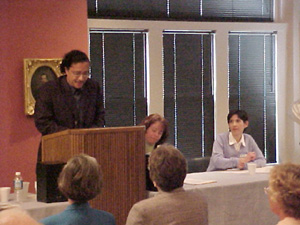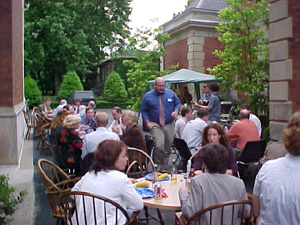The Filson Institute
Spring 2003 Academic Conference
By Brian Pollock
Education and Special Events Assistant
About |
 The Filson Institute for the Advanced Study of the Ohio
Valley and the Upper South hosted a two-day academic conference
this spring, May 16-17, to examine the ways the region
has been historically viewed over time, from the 17th
century to the present. Conference presentations and discussions
looked at new historical approaches that can change our
thinking of the region’s past. The conference featured
historians from throughout the nation with unique approaches
to the study of the region’s history. They shared
their findings with a community of scholars and interested
public.
The Filson Institute for the Advanced Study of the Ohio
Valley and the Upper South hosted a two-day academic conference
this spring, May 16-17, to examine the ways the region
has been historically viewed over time, from the 17th
century to the present. Conference presentations and discussions
looked at new historical approaches that can change our
thinking of the region’s past. The conference featured
historians from throughout the nation with unique approaches
to the study of the region’s history. They shared
their findings with a community of scholars and interested
public.
A call for papers in fall 2002 announced the search for current scholarly work pertaining to the theme of the conference "Constructing and Reconstructing a Region: 21st-Century Approaches to the Ohio Valley’s History." The program committee received many proposals from a variety of scholars on topics, including conflicting visions of the 18th-century frontier, the migration of African Americans, racial and ethnic diversity, gender roles, power and politics, and historical memory of the Ohio Valley before the 21st century. The committee chose 18 papers to be presented at this two-day conference, which helped to fill in gaps in the current scholarship of the region.
Rather than limit the definition of the Ohio Valley region to geographical boundaries, the conference broadened the definition through the exploration of key themes, focusing on a regional identity for an area that has served as a borderland between native groups of people and trans-Atlantic immigrants, the East and West, and the North and South. An examination of the exploration and settlement of the Ohio Valley further explored this identity along with discussions that ranged from the frontier settlement to Louisville’s race relations in the 1960s. By investigating these themes, the Institute hoped to construct the Ohio Valley region with 21st-century approaches.
The conference featured nine sessions over a two-day period. Sessions were arranged by themes in chronological order, and two papers were presented in each session. Following the presentation of papers, other scholars offered comments on them. The floor was then opened for questions, and many papers generated lively debate. The debate came from both the distinguished panel of scholars gathered as well as members of The Filson. Even after a long day of presentations, the dialogue still incisively examined the papers and their importance to the theme of the conference.
 Christine
Heyrman, professor of history
at the University of Delaware, acted as the conference
convener. Speakers included many former Filson Fellows
and leading scholars in their field. The wealth of intellectual
talent that joined us for The Filson Institute’s
Spring 2003 Academic Conference ensured the success of
the program. With the support of members who joined us
for this two-day conference, The Filson established a
forum for historical inquiry into the Ohio Valley region.
Christine
Heyrman, professor of history
at the University of Delaware, acted as the conference
convener. Speakers included many former Filson Fellows
and leading scholars in their field. The wealth of intellectual
talent that joined us for The Filson Institute’s
Spring 2003 Academic Conference ensured the success of
the program. With the support of members who joined us
for this two-day conference, The Filson established a
forum for historical inquiry into the Ohio Valley region.
This conference delivered an exceptional study of the history of the amorphous Ohio Valley region. Through innovative, modern approaches of interpreting days-gone-by, The Filson Institute looked to define this region in a 21st-century context. The identity was constructed and reconstructed throughout the weekend as the papers presented the wide array of scholarship that is available on this region. The conference not only helped to answer many of the current questions about the identity of the region, but it also raised new questions. Many of the papers presented have become works-in-progress as questions and comments from the audience sparked different thoughts on the organization of the original papers and opened new avenues for additional research on the topics. Thank you to all who participated in the Spring 2003 Academic Conference. We look forward to continuing to provide opportunities for scholars and the general public to learn more about our region through The Filson Institute.
The Filson Historical Society
1310 South Third Street - Louisville, KY
40208
Phone: (502) 635-5083 Fax: (502) 635-5086
Hours
The Ferguson Mansion and Office
Monday - Friday: 9 am. - 5 pm.
Saturday and Sunday closed
Library
Monday - Friday: 9 am. - 5 pm.
Saturday: 9 am. - 12 noon
